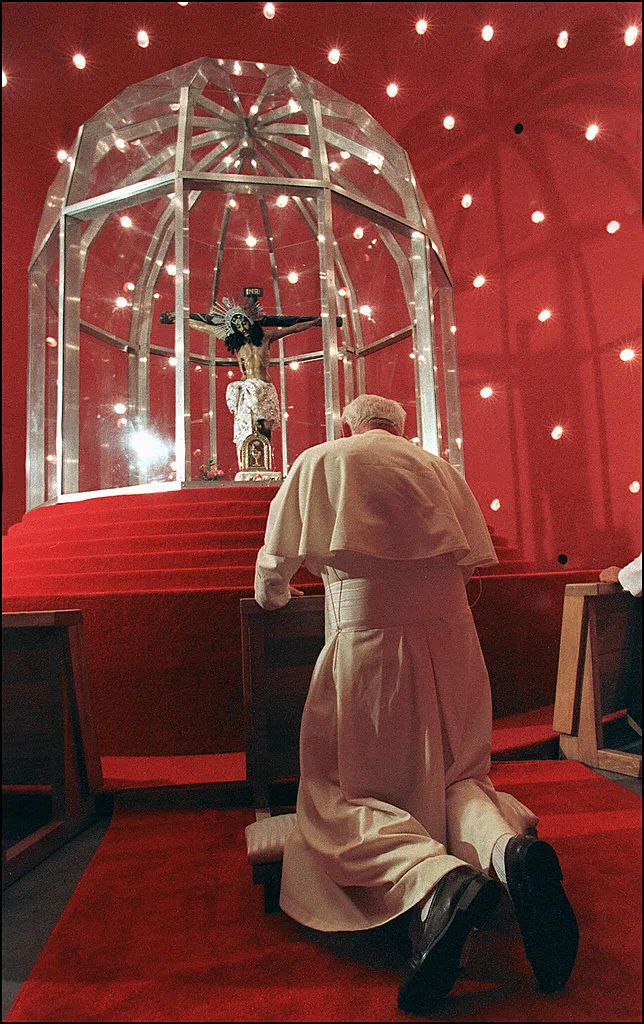
Lima, Peru, Jan 21, 2018 / 08:49 am (CNA/EWTN News).- Speaking to contemplative women religious Sunday, Pope Francis said that they aren’t second-class, but a necessary part of the Church, and asked them to continue to pray on behalf of the Church and sinners.
“Sisters, know something: The Church doesn’t tolerate you, it needs you!” the Pope said in off-the-cuff remarks Jan. 21.
“Be beacons of light. And pray for the Church, for the shepherds, for those who hurt others, and those who exploit their siblings. And going on with the list of sinners, don’t forget to pray for me.”
Pope Francis spoke during a homily at the end of praying “Terce,” the prayer of the Liturgy of the Hours sung or said at 9a.m., with contemplative women religious in Lima’s Shrine of the Lord of Miracles.
The prayer took place on the last day of his Jan. 18-22 apostolic visit to Peru, which followed a three-day visit to Chile. He will return to Rome Jan. 22.
In his homily he quoted St. Therese of the Child Jesus, who once wrote in a letter: “I was certain that love subsumes in itself all vocations, that love is everything, encompassing all times and places, in a word, that love is eternal…in the heart of the Church, who is my Mother, I will be love.”
“To be love! This means being able to stand alongside the suffering of so many of our brothers and sisters,” Francis continued. “In this way, your cloistered life can attain a missionary and universal outreach and play ‘a fundamental role in the life of the Church.’”
“For this very reason, we can state that cloistered life neither closes nor shrinks our hearts, but rather widens them in our relationship with the Lord,” he explained. “May intercession for those in need be the hallmark of your prayer.”
The Pope also noted the words of St. Paul in his Letter to Romans, where he says that we have received a spirit of adoption, making us “children of God.”
“Those few words sum up the richness of every Christian vocation: the joy of knowing we are God’s children,” Francis said. This is the experience that nourishes our lives, that seeks always to be a pleasing response to God’s love. How important it is to renew this joy day by day!”
Following his meeting with women religious, Pope Francis made a stop at the Cathedral of Lima to pray in front of relics of five Peruvian saints.
During the stop he prayed in silence for a few minutes, before offering a prayer together with those present, stating his thanksgiving for the gifts the Lord has bestowed on the Church in Lima, especially the gift of holiness, “that has flourished in our land.”
“Our Archdiocesan Church has been made fruitful by the apostolic labors of Saint Turibius of Mogrovejo, enlarged by the prayer, penance and charity of Saint Rose of Lima and Saint Martin de Porres, adorned by the missionary zeal of Saint Francisco Solano and the humble service of Saint Juan Macías,” he prayed.
After the prayer and benediction, Francis met with the bishops of Peru in the chapel of Lima’s chancery.
In his speech to bishops he focused on the 16th century saint from Spain, St. Turibius of Mogrovejo, who served as the archbishop of Lima for 25 years, and is known for having upheld the rights of Peru’s indigenous peoples.
He was canonized in 1726, making him one of the first canonized saints of the Americas. During his time as archbishop, Turibius made three different visitations to the land of his diocese, crossing rugged and dangerous terrain.
“He went out to encounter everyone, along paths that, in the words of his secretary, were meant more for goats than for people,” Francis said.
“He knew that this was the one way to be a pastor: to be close to his own, dispensing the sacraments, and he constantly exhorted his priests to do the same,” not just with words, but as a witness “in the front lines of evangelization.”
The Pope noted that when St. Turibius was visiting and living with his people he learned to speak their languages so that they could really understand the Gospel, and it could touch their hearts.
This is a good lesson for bishops of the 21st century too, he pointed out, who not only sometimes need to learn new languages in the traditional sense, but also to learn the language of the digital age, in order to communicate well with young people, families and children.
St. Turibius also believed that “there could be no evangelization without charity,” Francis said. “He knew that the supreme form of evangelization is to model in our own lives the self-giving of Jesus Christ, out of love for every man and woman.”
“Dear brothers, work for unity,” Francis concluded. “Do not remain prisoners of divisions that create cliques and hamper our vocation to be a sacrament of communion.”
“Remember: what was attractive about the early church was how they loved one another. That was – and is and always will be – the best way to evangelize.”
At the end of the meeting, the Pope also held a lengthy question-and-answer session with the bishops.
If you value the news and views Catholic World Report provides, please consider donating to support our efforts. Your contribution will help us continue to make CWR available to all readers worldwide for free, without a subscription. Thank you for your generosity!
Click here for more information on donating to CWR. Click here to sign up for our newsletter.




Leave a Reply